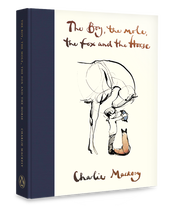 Have you read it? Seen it? Heard about it? It’s a Barnes and Nobles Book of the Year illustrated novel and an Academy Award-winning short film. Still, most importantly, it is a beautifully illustrated story about friendship and a boy learning life lessons from a group of animals. Before—and after—the hoopla of awards and recognition, this is a powerful story of friendship that serves as a springboard for conversations about well-being. Whether you are an adult or a child, there are valuable opportunities to begin or extend your thinking about well-being concepts such as kindness, optimism, and gratitude. What is well-being literacy? The intentional use of well-being-relevant vocabularies, knowledge, and language skills, such as kindness, optimism, and gratitude, to improve the well-being of oneself, others, and the world is coined well-being literacy. One of the reasons this story is so powerful is because it discusses well-being concepts that matter so clearly and delightfully. The captivating pictures and simple text make this story easy for adults and children alike to be more thoughtful. Today, let’s focus on one of the essential ideas woven throughout the story: kindness. There are certainly others to be mined, such as optimism and gratitude. We will save those for another day! Did you know that kindness creates positive changes in the brain? It boosts the chemicals serotonin and dopamine. And endorphins can be released. These neurotransmitters in the brain give you feelings of satisfaction and well-being. They cause the pleasure/reward center of your brain to light up. Our brains also release the hormone oxytocin, which is responsible for feelings of love and trust. It supports bonding, arouses empathy, promotes positive memories, and helps us communicate positively. Research connects oxytocin with generosity. For example, people infused with oxytocin were 80% more generous in sharing money with a stranger than those without oxytocin. Regularly performing kindness behaviors can enhance thinking skills such as creativity and flexibility. Research has shown that agents or givers of kindness demonstrate increases in self-esteem, empathy, and compassion. They also become more resilient, psychologically and physically. Significant physiological impacts include reduced inflammation, decreased blood pressure, and decreased cortisol (i.e., Fredrickson & Kok, 2016; Mayo Clinic, 2020; Post, 2005). And, remember, kindness is a two-for!! It benefits both the giver and the receiver. So light up your brain with some acts of kindness. “I’m not afraid,” said the mole. “If I wasn’t caught in this snare, I’d kill you,” said the fox. “If you stay in that snare, you will die said the mole. So, the mole chewed through the wire with his tiny teeth. Mackesy provides an example of courageous kindness, choosing to extend kindness to another even when those around us aren’t kind; it may include fear, anxiety, and/or an element of risk. What are ways that you or the children in your life are kind? Do you know anyone who is kind in a courageous way? Of course, acts of kindness do not need to be this fearless. Ideally, they are consistent and intentional. Dr. Ishak, the author of the Science of Kindness and professor of psychiatry at Cedar-Sinai Hospital in Los Angeles, asserts that consistency is essential. He explains that acts of kindness have to be repeated. From a physiological perspective, a single act of kindness provides an oxytocin boost that lasts 3-to-4 minutes. We want more feel-good hormones than that! Random acts of kindness is not only a popular phrase; it promotes many excellent and helpful acts. In fact, research shows that being kind to strangers is a good thing. Acts of kindness to strangers have equally positive effects on happiness as kindness to ourselves and loved ones. However, consistency and intentionality bump up the benefits. Passmore and Oades (2016) take the notion of random acts of kindness even a step further with their concept of CAKE, a consistent approach to kindness and empathy. This approach encourages one to display acts of kindness to others by holding an empathetic stance towards all well meet-- whether they are friends, strangers, or even those without good intentions, such as the person who cuts in front of us in line or perhaps the colleague we see shouting at his staff. CAKE encourages the individual to adopt a mindset, not just when the mood takes them, but as a permanent way of being. Can you learn to think and act this way more consistently, not just on the one day of the week designated to do a random act of kindness? Intentionality is key. By building an intentional practice, one can move from occasional random acts of kindness to a CAKE mindset. Purposefully practicing acts of kindness daily will eventually become integrated into our daily routine and part of our mindset. Begin with intentionality, and eventually, kindness will become woven into the fabric of your day and become a part of your mindset. Thus, yielding you all the wonderful benefits discussed and the benefits to your recipients. Take an ecological approach to your kindness practice. Extend kindness in your personal relationships and with your family. Consider your other environments, including friends, co-workers, school, neighborhood, and self-compassion. And remember yourself. Kindness to you, or self-compassion, will undoubtedly set you awash will all the feel-good hormones and light up your brain! Reach out for more ideas! Share your email and subscribe below for a FREE RESOURCE: Intentional Strategies & Planning Template. Find the book at www.charleymackesy.com
Comments are closed.
|
Author: Karin H. Spencer, EdD, NCPTThanks for visiting the Uplift Blog! I'm an educator, Pilates enthusiast (NCPT), reflective practitioner and Ironman triathlete. I love helping others discover their joy and confidence as movers. I support others in making lifestyle changes to improve health and well-being. As a life-long educator, I am especially committed to joining together with teachers to uplift each other. Archives
May 2023
Categories TERMS AND CONDITIONS PRIVACY POLICY DISCLAIMER
c 2022 All Rights Reserved Education and Wellness Consulting, LLC |
Search by typing & pressing enter


 RSS Feed
RSS Feed